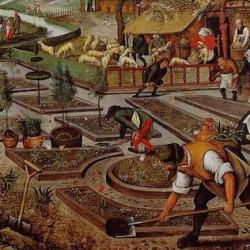George Gilder suggests in Telecosm that economists study scarcity rather than abundance because the former is measurable, and the latter approaches infinity (and hence zero price): “The economists’ focus on scarcity stems from the fact that shortages are measurable and end at zero. They constrain an economic model to produce a clearly calculable result, an identifiable choke point in the industrial circuitry. Abundances are incalculable and have no obvious cap. They tend to end in a near zero price and thus escape economics altogether. As the price declines and their role in the economy becomes more vast and vital, their role in economic analysis diminishes. When they are ubiquitous, like air and water, they are invisible – ‘externalities.’ Yet abundances are the driving force in all economic growth and change. In free economies, scarcities find their meaning chiefly in the abundances they engender and constrain.”
Perhaps it’s merely measurability; perhaps it’s the shadow of Malthus. But this comment raises the possibility of an economics constructed not on scarcity but on abundance. Stephen Long has made a beginning with his theological treatment of economics, Divine Economies .













